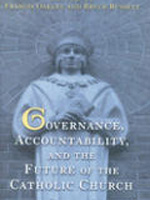 Margaret O’Brien Steinfels has pointed out that the sexual abuse scandal so troubling the Catholic Church is more than a crisis about sexual abuse; it is an ecclesiological crisis. The crisis has generated various initiatives on the part of concerned Catholics, among them Voice of the Faithful and Boston College’s “Church in the 21st Century” project. Governance, Accountability, and the Future of the Catholic Church, edited by Francis Oakley and Bruce Russett, represents another response, this time by the Saint Thomas More Chapel at Yale University’s Catholic Center. It collects the papers given at the chapel and the Yale Law School during a weeklong conference in March 2003, which had a size and scope unprecedented in the chapel’s history.
Margaret O’Brien Steinfels has pointed out that the sexual abuse scandal so troubling the Catholic Church is more than a crisis about sexual abuse; it is an ecclesiological crisis. The crisis has generated various initiatives on the part of concerned Catholics, among them Voice of the Faithful and Boston College’s “Church in the 21st Century” project. Governance, Accountability, and the Future of the Catholic Church, edited by Francis Oakley and Bruce Russett, represents another response, this time by the Saint Thomas More Chapel at Yale University’s Catholic Center. It collects the papers given at the chapel and the Yale Law School during a weeklong conference in March 2003, which had a size and scope unprecedented in the chapel’s history.
The outstanding group of sixteen Catholic historians, theologians, journalists, social scientists, and executives who gathered for the conference were asked to examine the roots of the crisis and to propose solutions that would be in keeping with the rich history of the Catholic tradition. What precedents exist for structural revisions that would give greater accountability and responsibility, for clergy and laity? What might theology contribute toward these goals, and has the theological vision of the Second Vatican Council found expression in canon law? Are there legal, political, and financial models that might create greater accountability and participation, without the dangers of government by plebiscite? And what does the American experience contribute in terms of forms of participation that might balance loyalty with demands for greater accountability? Each contribution makes fascinating reading.
The historical, political, and practical analysis of the contributors is extremely helpful, though I would like to have seen more of the theological. The church may exercise authority in a top-down way, but theologically it is an interdependent communio of pastors and faithful, even if this is not reflected in its structures. Still, Governance, Accountability, and the Future of the Catholic Church forced me to revise my own thinking. It convinced me that renewal means more than simply renewing the way authority is exercised; it must also involve the reform of structures that will provide for greater accountability and a system of checks and balances now almost entirely lacking. This is an important book. After reading it, the old line “the church is not a democracy” does not sound quite so final.
Thomas P. Rausch, S.J., is the T. Marie Chilton Professor of Catholic Theology at Loyola Marymount University, Los Angeles, California. This review was in America: The National Catholic Weekly and is excerpted here with permission.